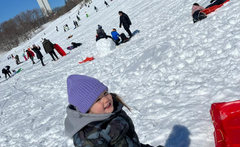By the start of your baby’s second month, hopefully you’ll have settled into a routine schedule around your baby’s feeding and naps. You’ll have adjusted to an additional member in the family and start to understand your baby’s general temperament.
Your baby is learning and developing a ton in all domains of development, including social/emotional, language/communication, cognitive (learning, thinking, problem-solving), movement, and sensory. Keep reading to learn more about milestones that most babies are reaching at 2 months.
Keep in Mind
Keep in mind that the actual age when a typically developing child reaches a milestone really can vary. Each child develops in their own unique way, so there's no need to worry unnecessarily if your child isn't hitting a milestone right away, especially if your child is hitting most milestones in other domains.
That being said, you are your child's best advocate. If there is an issue, it's always best to act early, so if you have any concerns about your child's development, please speak with your pediatrician.
Social & Emotional Milestones

By the second month, your baby will spend lots of time observing and listening to the people around her. During these months, you might get to witness your baby's first true social smile! Smiling will give her another way other than crying to express herself and her needs.
Babies at this age typically don’t have separation anxiety yet and aren’t wary of new people, but you can expect the separation anxiety to begin at around 6 months.
During these early months, there’s no need to worry about spoiling your baby with too much attention. In fact, the faster and more consistently you attend to your baby's fussing in the first six months, the less demanding she’s likely to be when she’s older. By helping her establish a sense of security now, you're laying down a foundation for the confidence and trust that allow her to gradually separate from you and become a strong and independent individual.
Many babies at this age:
- May begin to smile at people
- Can briefly calm self by sucking on hand
- Try to look at parent
- Imitate some movements and facial expressions
Language & Communication Milestones

At two months, your baby may begin cooing by repeating some vowel sounds (“ah-ah-ah”, “ooh-ooh-ooh”). He may also make gurgling sounds and experiment with making sounds with his lips. Even though no real meaningful words are being produced, cooing helps babies develop the muscles they’ll use later on when they learn to talk.
Encourage communication by imitating his cooing and expand with some simple words and phrases. You should also read books to your baby, even if he doesn’t understand what you’re reading.
Many babies at this age:
- Begin to coo, make gurgling sounds
- Turn head toward sounds
- May smile at the sound of your voice
Cognitive Milestones
Babies are like sponges and learning at a rapid rate. At two months, reading picture books, playing music, introducing new objects and providing plenty of sensory-stimulating opportunities will help stimulate your baby's cognitive development.
Check out Jenny & Andy's Organic Plush Rattle Cubes pictured in the photo above. In addition, speaking to your baby in a gentle and soothing but adult voice will also help learning.
Many babies at this age:
- Pay attention to faces
- Begin to follow things with eyes and recognize people at a distance
- Show boredom (by crying or fussing) if activity doesn’t change
Movement Milestones

One of the most crucial developments during this time is your baby’s increasing neck strength.
When on her stomach, she will struggle to raise her head up to look around before two months. But designate some “tummy time” every day to help strengthen her neck muscles so that she’ll be able to hold her head and chest as she supports herself on her elbows by four months. This will be a major milestone that will give her freedom and control instead of just staring up while on her back.
Your baby’s legs muscles will also become stronger and more active. They’ll also start to straighten from their inward-curving newborn position. Kicking is still mainly reflexive, but they’ll quickly gather force and she might be able to kick herself over from front to back by the end of the third month.
Many babies at this age:
- Make smoother movements with arms and legs
- While lying on tummy, push up on arms
- While lying on tummy, lift head up
- Are able to move fists from closed to open
- Are able to bring hands to mouth
- Move legs and arms when excited
Sensory Milestones

At one month, your baby still can’t see clearly beyond 12 inches, give or take, but your baby will closely observe anything within that range. The human face is his favourite thing to look at and his attention is automatically drawn to your face and, in particular, your eyes. As his visual range increases, he’ll take in your whole face instead of a single feature, and he’ll be much more responsive to facial expressions.
By two months, your baby’s eyes will be more coordinated and can work together to move and focus at the same time. Soon, he’ll start to track moving objects that are close by.
Just as your baby naturally prefers the human face over other visuals, he also prefers the human voice over other sounds. He loves his mother’s voice as he’s been hearing it since before birth in utero. He associate’s mom’s voice with warmth, food, and comfort.
Many babies at this age:
- Calm with rocking, touching, and gentle sounds
- Enjoy a variety of movements
- See limited colour
- Begin to follow things with their eyes
- Will turn towards the source of food (breastmilk)
- Will crave skin-to-skin contact
- Are attract to sweets (breastmilk) and anticipates feeding
Want a handy checklist all in one place?
Download our Comprehensive Developmental Milestones Checklist PDF for free ☑️!
Developmental Milestones By Age
Sources:
- American Academy of Pediatrics. Caring for Your Baby and Young Child, 7th Edition: Birth to Age 5, Fifth Edition. 2009
- Centers for Disease Control and Prevention. Important Milestones: Your Baby By Four Months, 19 Oct. 2021.
- What To Expect. 2-Month-Old Baby, 22 Dec. 2020.
- What To Expect. When Do Babies Start Cooing?, 21 Oct. 2021




